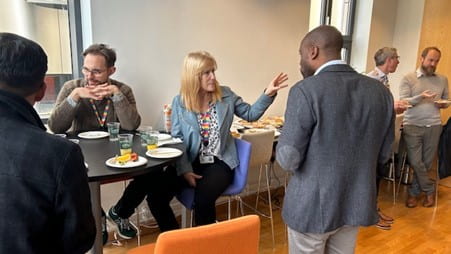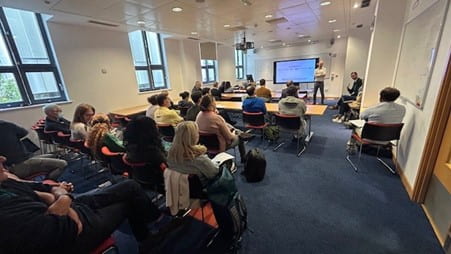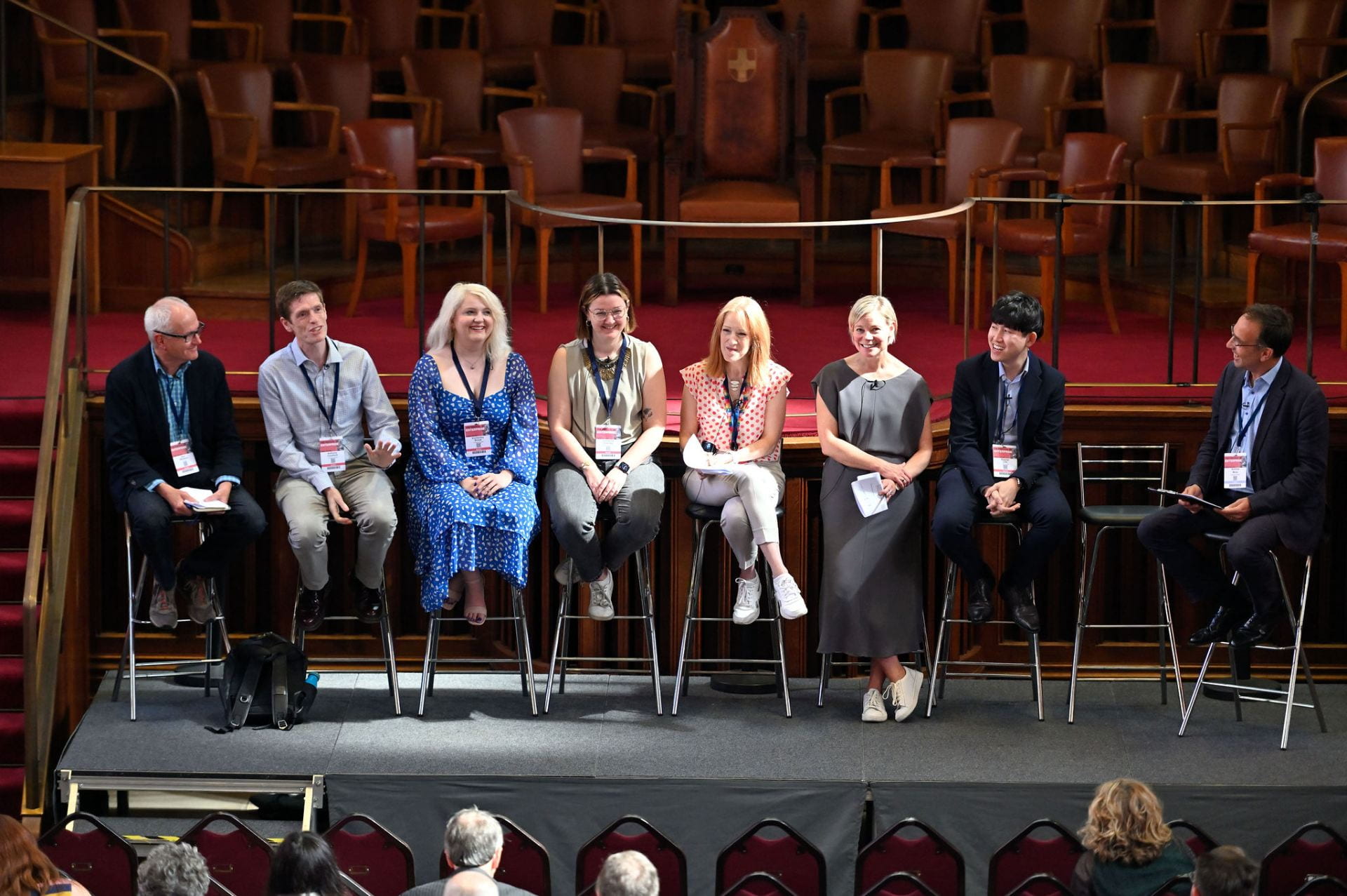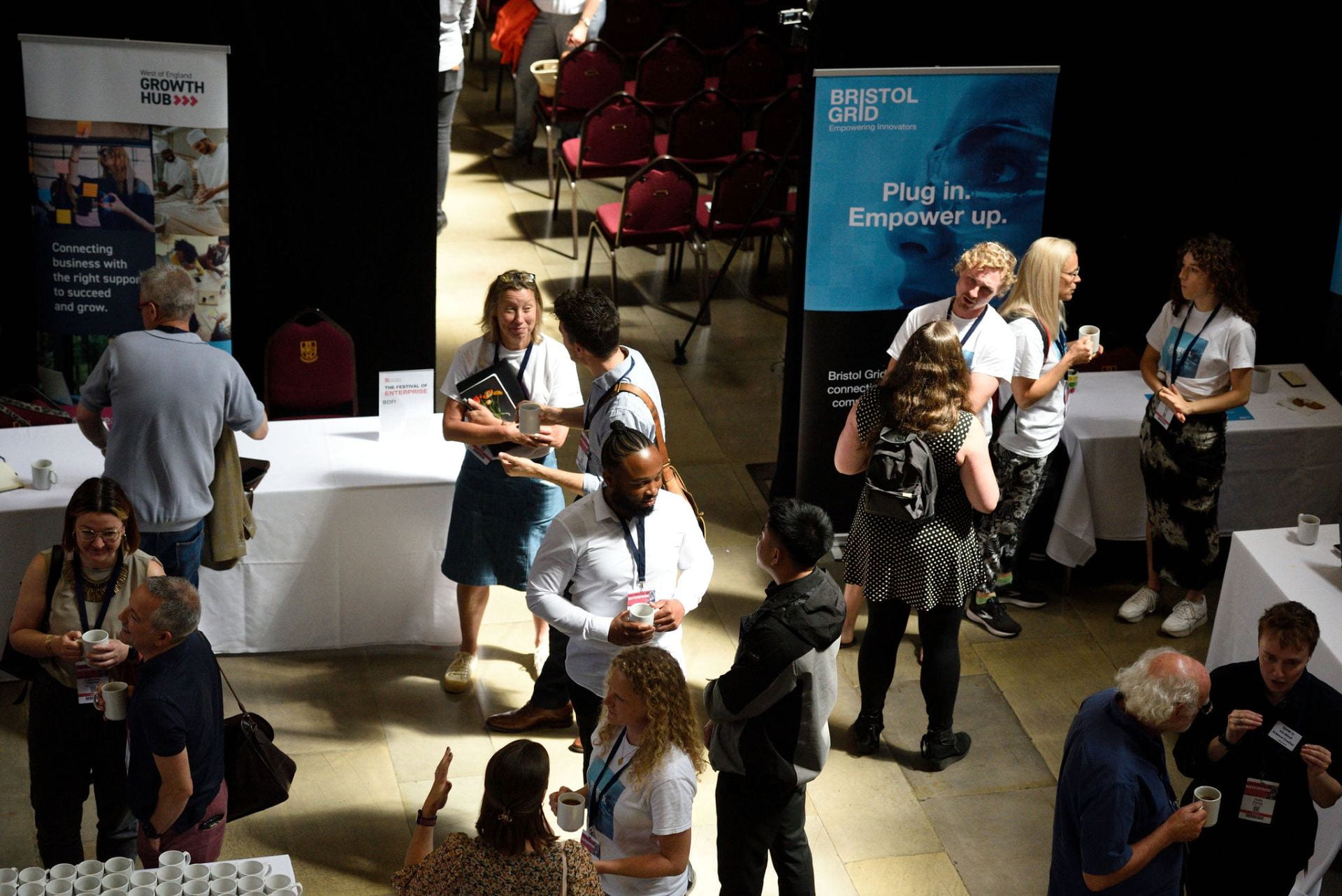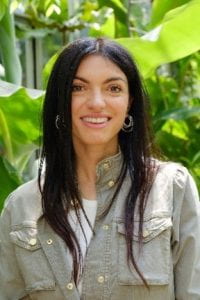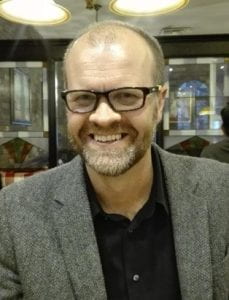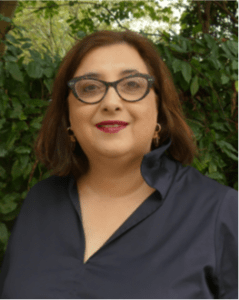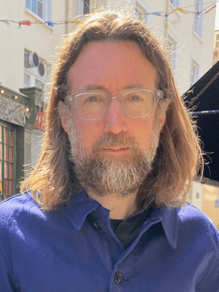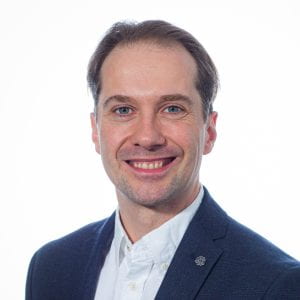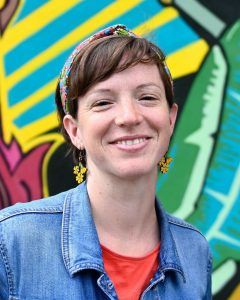By Michele Barbour
Our Research Commercialisation Team has grown rapidly over the past year, and has attracted some talented and energetic new joiners. Charlotte Severn recently joined the Team as a Research Commercialisation Associate and, alongside her colleague Lasani Wijetunge, has been selected for the prestigious LifeArc AUTM Technology Transfer Fellowship. I caught up with Charlotte and Lasani to ask them about their new career moves and what they hoped to gain from the Fellowship, as the first people from the Bristol team to take part in this scheme.
Charlotte, Lasani, could you tell me a bit about yourselves and your careers to date please?
Lasani
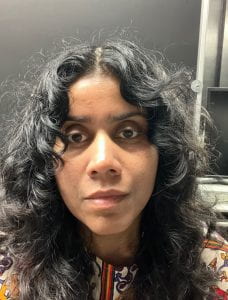
I have always been interested in understanding how science discoveries made at the bench could
translate into products that make a tangible societal impact. At the end of my PhD studies at the University of Edinburgh with Prof. Peter Kind, I was involved in an internationally collaborative study in partnership with a biotech firm, Seaside Therapeutics, USA, that led to a highly successful pre-clinical validation of a targeted therapy for fragile X syndrome, a monogenic cause of autism. The strong pre-clinical validity of the drug led to Roche’s first foray into clinical trials of a drug for fragile X. It was also a first-hand experience in understanding and appreciating the trials and tribulations associated with the quest for developing targeted therapies for complex disorders, especially in the rare disease space.
My recent work in the School of Physiology, Pharmacology and Neuroscience was with Dr. Michael Ashby and Prof. Jack Mellor on cholinergic modulation of sensory processing. There is evidence to suggest that cholinergic neuromodulation is dysregulated in both neurodevelopmental and neurodegenerative disorders. This work has been supported by Marie Skłodowska-Curie Actions, Elizabeth Blackwell Institute/Wellcome Trust, and an Academic career developmental fund from UoB.
Charlotte 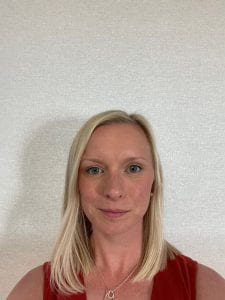
I have always had an interest in science and the natural world so I always knew I wanted to go to university to study for a science degree. At the time Biomedical Sciences gave a young person without a chosen career a broad basis in something I was fascinated by.
My interest in scientific research was cemented during a research project as part of a masters degree here at Bristol with Prof. Stuart Siddell in virology. Prof. Siddell first introduced me to cell culture and genetic manipulation, the possibilities were seemingly endless. My PhD project was then in Prof. Ashley Toyes group to re-create the bone marrow niche using a 3D culture model to increase the yield of ex vivo derived red blood cells. Developing the system we created a second generation scaffold which we “decorated” with peptides to increase biomimicry. During the latter part of my research career I developed the macrophage arm of the group. Investigating the macrophage phenotype during polarisation and their involvement during processes such as wound healing and cancer.
Charlotte, I understand you’ve recently joined our commercialisation team as a Research Commercialisation Associate. Congratulations! What inspired you to take that career direction?
Having been a part of a highly translational team who had successfully spun out Scarlet Therapeutics, I have had first hand experience of witnessing great research impact. Through reflection during many lockdowns and insightful discussions with a fantastic mentor I decided that a career supporting researchers through translation rather than research itself was ultimately where I wanted to be. Having looked into the field and through speaking to a contact in the commercialisation team about technology transfer I knew that’s what I wanted to do.
As such I am thrilled to have made the jump, pivoting my career whilst utilising my scientific background whilst having the challenge of gaining experience in aspects of business, patent law and marketing throughout the commercialisation lifecycle.
You have both been selected for a very prestigious LifeArc AUTM Fellowships – perhaps you could explain what that is and what you hope to gain from the experience?
Charlotte
The LifeArc AUTM Technology Transfer Fellowship is an opportunity for academics to transition into careers in technology transfer through a year-long program of networking, training and mentoring. Since its launch in 2017 it has supported over 55 fellows into careers within the innovation sector.
The fellowship year kicks off with AUTM University in Kansas City USA, a crash course in all things technology transfer with an opportunity to network with colleagues from across the globe. We will also attend the American and European associations of technology transfer annual conferences allowing extensive networking with the most influential players in the field. The fellowship provides two mentors; a prominent leader in the field and a “buddy” alumni mentor. After such a positive first experience with mentoring I hope the support will aid in successfully navigating the transition from academia enabling me to achieve my goals and hone new skills developed during the year.
Lasani
I was not aware of LifeArc-AUTM fellowship until few days before its deadline-it was an accidental discovery via a link a friend of mine sent to me. I knew of LifeArc, but not of AUTM then. I am interested in developing a career that facilitates transformation of society by science and technology, and this felt like an amazing opportunity. So I am thrilled to become a LifeArc-AUTM fellow to learn about the process of commercialisation of science discoveries to products that meet an unmet need, and engage in making these products inclusive to all.
What are you most looking forward to after the fellowship – what do you aspire to in terms of commercialisation at UoB?
Charlotte
I hope that the fellowship will provide a solid basis for a longstanding career in research commercialisation. Through the formal and independent learning I can implement knowledge gained directly into my current role. Contacts made through the extensive networking opportunities will provide a treasure chest for the wider team to call upon for investment and funding opportunities, insights into particular processes and general advice. The network of fellows alone across the UK and Europe will provide a lens into other tech transfer offices to enhance the ecosystem here within the Department of Research Enterprise and Innovation (DREI).
Ultimately my own aspirations over the coming years is to become a Registered Technology Transfer Professional (RTTP) and managing my own portfolio, supporting our incredible academics on the journey of translating science into real world impact.
Lasani
Technology transfer is multifaceted: its success relies on the meeting of minds between the innovator(s), corporate partner(s), and legal partner(s) as well as abiding by the governmental affairs. I am hoping that the year-long fellowship would provide insights into how these viewpoints intersect to bring about a change. More so, I am looking forward to understanding how you scrutinise the potential (commercial and/or humanitarian) of a science discovery to start with. As a scientist, I am always excited by the science, but this feels like taking that step back to really question the product-market fit. What is my why? Is there really a need? How do you synthesis the science (often as scientists we love the details) and communicate the high-level view to persuade a different audience… this could well be making an educated projection far into the future, e.g., in life sciences, drug discovery to clinic could be +10 years! The ecosystem currently feels like the riskier explorative phase is carried by startups/small biotechs that then might develop it further themselves or partner with and/or sell to a large corporation. Universities and affiliated biotech accelerators can play a key role in this early phase to nurture the inventors to develop their technology, e.g., UoB Enterprise team, SETsquared and Bristol’s incubation spaces like Engine Shed and Science Creates. I am hoping that the fellowship will give me a greater understanding of how these relationships are developed and fostered.
And finally – now you have started your fellowship and returned home from your intensive week in Kansas, what did you gain from the experience?
Lasani
It was an amazing opportunity as a novice to the field to gain insights into the fundamentals of commercialising a science discovery and learn about best practises: from evaluating its potential to negotiating with a potential licensee.
The thing that stood out was how passionate the specialist instructors were, and how engaged the technology transfer community is to help each other navigate it. It was also our first in person get together as the 2023/24 cohort of LifeArc-AUTM fellows; it was great to discover our backgrounds, share common issues we have faced and discuss our goals.
Charlotte
It was truly a fantastic opportunity, the course gave an excellent base of knowledge for me to establish a career in technology transfer and I was able to begin developing my network. I supplemented the knowledge gained since the start of my role in June with sessions including; valuing assets, reaching partners, licensing and negotiation skills. I was also lucky enough to share the experience with the 2023/2024 cohort of the LifeArc AUTM Technology Transfer Fellows, hearing their experiences, motivations and career aspirations.
If I had to choose a take home message it would be the importance of forming communicative relationships within the field; both with inventors and partners throughout the commercialisation journey but also those within technology transfer by means of advice and knowledge sharing.
Thanks Charlotte and Lasani, and we look forward to hearing more about your experiences! I also caught up with Andrew Wilson (Head of Research Commercialisation) about two of his team being selected for the fellowship.
Andrew Wilson, Head of Commercialisation
The LifeArc-AUTM fellowships are a fantastic opportunity to really kick-start a career in Research Commercialisation and better enable them to support the progression of great science into patient benefit. I am so pleased that Charlotte and Lasani are part of this. This programme will broaden their experience in this exciting field, allow them to learn from international best practice and, perhaps most importantly, grow their vital professional networks in this exciting field. I am really looking forward to working with them both over the coming years.
 arly Career Enterprise Fellows. James, who is a PhD student in Advanced Composites in the EPSRC CoSEM CDT – Composites Science, Engineering and Manufacturing, used his fellowship as a means to advance the Technology Readiness Level of a dynamic induction coil for energy efficient composite manufacturing. When asked about his experiences, James shared:
arly Career Enterprise Fellows. James, who is a PhD student in Advanced Composites in the EPSRC CoSEM CDT – Composites Science, Engineering and Manufacturing, used his fellowship as a means to advance the Technology Readiness Level of a dynamic induction coil for energy efficient composite manufacturing. When asked about his experiences, James shared:












